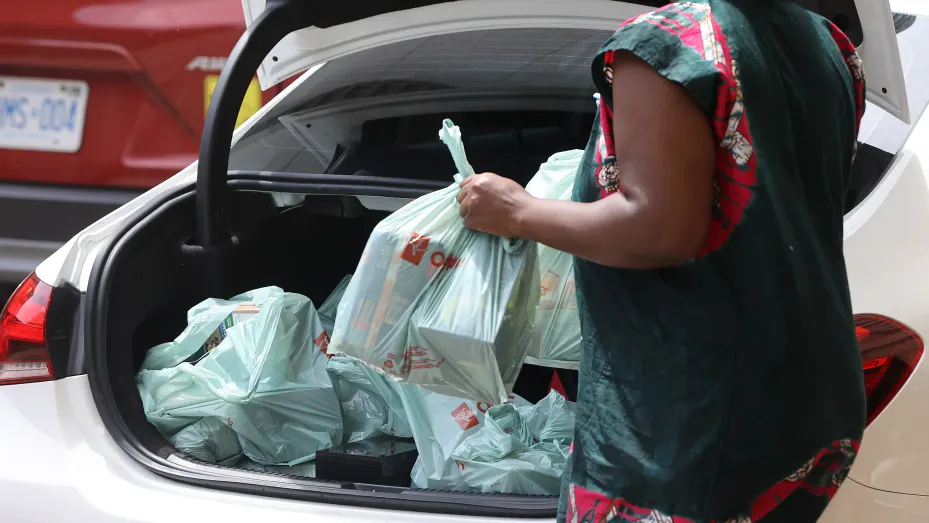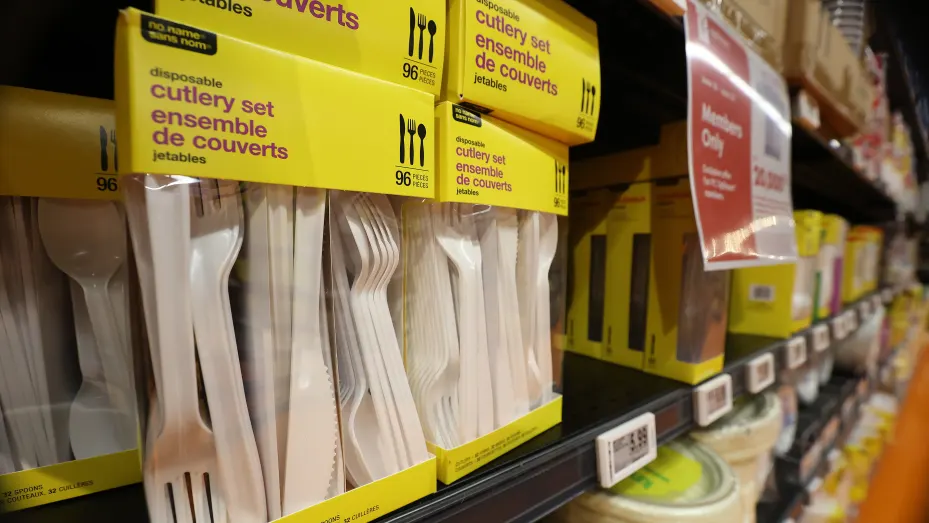Show and Tell With Pride
 |
Restaurants and grocery
stores worry about a supply of alternative products as the government
announces details of its ban on single-use plastics. in Toronto. June
20, 2022. Steve Russell | Toronto Star | Getty Images |
"By the end of the year, you won’t be able to manufacture or import these harmful plastics. After that, businesses will begin offering the sustainable solutions Canadians want, whether that’s paper straws or reusable bags.""With these new regulations, we’re taking a historic step forward in reducing plastic pollution, and keeping our communities and the places we love clean.""We have not closed the door to banning certain other single-use plastics.We're starting with these ones because, based on the data we have, these are the most harmful plastic substances. But it may be the case that we decide in the near future to ban some others."Steven Guilbeault, minister of environment and climate change, Canada"The government needs to shift into high gear by expanding the ban list and cutting overall plastic production.""Relying on recycling for the other 95% is a denial of the scope of the crisis.""It's a drop in the bucket. Until the government gets serious about overall reductions of plastic production, we're not going to see the impact we need to see in the environment or in our waste streams."Sarah King, head, Greenpeace Canada, oceans and plastics campaign
 |
Restaurants and grocery
stores worry about a supply of alternative products as the government
announces details of its ban on single-use plastics. in Toronto. June
20, 2022. Steve Russell | Toronto Star | Getty Images |
The Liberal government of Justin Trudeau is a virtue-signalling administration like few others. It is also self-congratulatory to the Nth degree, and madly in love with photo opportunities certain to be splashed over the front pages above the fold of every newspaper in Canada. And if the news is of a type that addresses a universal problem, the chances are it will reverberate further than Canada and make it to the news of the day on global media; all the better for a government obsessed with itself and with the efficacy of its patinated veneer. Shiny, green and of-the-moment.
So, there it is, another campaign promise half-fulfilled. No more plastic straws, single-use shopping bags, plastic cutlery, etc. Makers and users of such indispensable, environment-cluttering garbage have until 2024 to figure out either how to get along without them, or plausible replacements. The industry is staggering under the challenge, and outraged that it has been targeted. Too bad the same cannot yet be said of the same industry that now proliferates transparent plastic clamshells full of fresh fruits and vegetables on grocery shelves and those neat little plastic carry-bags of same.
Can't make everyone happy, can we? Some environmental groups speak of the bans as typically cosmetic, leaving the vast majority of plastic waste in Canada yet to be dealt with. Even the government's own science sources indicate the ban will have a negligible effect on, for example, ocean health, the very goal of the ban. The fact is, the real plastic culprits messing up Canada's shorelines and its portion of the world's oceans, are being ignored; at the very least not adequately addressed.
A 2019 study Environment Canada commissioned to examine the state of the Canadian plastics market estimated just one percent of Canadian plastic waste was lost to "leakage"; the meaning of which is that the waste entered the environment as litter. Of 3,268 kilotonnes of plastic waste generated in 2015, 3,239 kilotonnes was "collected"; mostly in landfills, not recycling. The Deloitte study recommended that the leakage could be reduced ten-fold by efforts "to reduce litter"; no mention of plastic bans as a solution.
The proposed federal plastics ban relied on data providing a scientific backgrounder from the Great Canadian Shoreline Cleanup in estimating the effect of plastic on waterways of Canada. In their 2018 report, plastic bags actually ranked sixth, and straws ninth, as items most often recovered from cleanups on shorelines. Among the worst offenders, bottle caps and cigarette butts accounting for 42.1 percent alone of all litter recovered. More recent cleanups featured rising rates of discarded surgical masks. None of these items are mentioned in the ban.
Ocean plastic is undeniably a growing global problem, but one driven almost exclusively by abandoned fishing gear, and poor waste management in the developing world. In Canada, a Ghost Gear Program was initiated in 2019, spending about $8.3 million recovering 739 tonnes of abandoned fishing gear from the oceans, representing close to a third of the estimated 2,500 tonnes of plastic litter Deloitte's report estimated find their way into the environment annually. Not among the six items the new ban targets.
 |
| A shopper places her goods into her car outside a supermarket. Canadians will need to find alternatives for plastic straws and grocery bags by the end of the year. (Mark Baker/The Canadian Press) |
Labels: Canada, Environmental Degradation, Plastic Waste, Plastics Ban, Research

0 Comments:
Post a Comment
<< Home